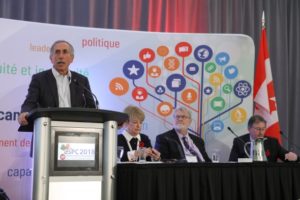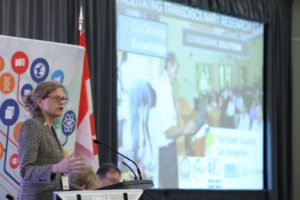Theme 4: Science and International Affairs

Day 1 – November 7th 2018
Takeaways and recommendations:
International Science and Canada – Addressing Global Agenda 2030 Together
Organized by: Gordon McBean, Professor, Western University and Past-President, International Council for Science
Speakers : Alan Bernstein, President & CEO, Canadian Institute for Advanced Research; David Grimes, Assistant Deputy Minister, Meteorological Services Canada and President of World Meteorological Organization; Ted Hewitt, President, Social Sciences and Humanities Research Council; Amy Luers, Executive Director, Future Earth; Maria Uhle, Co-chair of The Belmont Forum and Program Director for International Activities, Directorate for Geosciences, National Science Foundation; Wendy Watson-Wright, Chief Executive Officer, Ocean Frontier Institute
Moderator : Gordon McBean, Professor, Western University and Past-President, International Council for Science
Takeaways and recommendations
- Canada needs to develop a focused, coherent and integrated strategy and action plan for coordinating and funding science. How can Canada build on that plan to develop the international partnerships that are key to addressing global challenges while also exciting young people to pursue a career in science.
- Science is already helping society understand the global sustainability challenges and the range of potential solutions. But science has not yet helped to drive transformations to global sustainability – at least not on the scale that is needed and is appropriate for Canada to be a full participant in the international agenda.
- For science and technology to address these global challenges, the human perspective (i.e., social sciences) needs to be front and centre for all transformative research (i.e., instructing priorities, the conduct of research, the policy implications and implementation).
Collaborative models
- The Global Agenda 2030 : This 15-year global framework includes the 2030 Agenda for Sustainable Development (and 17 Sustainable Development Goals), the Paris Agreement on Climate Change, the Sendai Framework for Disaster Risk Reduction and related issues. It addresses large societal challenges in a more integrated way, including the economic consequences of inaction.
- Mission Innovation : 22 countries and the European Union have committed to work together on research and development. The agreement focuses on six challenge areas to help the Paris Climate Change Accord meet its objectives, including a pledge by each country to double their investment in renewable energy R&D. For example:
- The Canadian Institute for Advanced Research, along with the Mexican Ministry of Energy and the U.S. Department of Energy, brought leading scientists and thought leaders from around the world to a September 2017 workshop. Participants produced a scientific roadmap for cutting the time to develop new materials for clean energy from 20 years to one or two years. The transdisciplinary approach involves chemistry, high performance computer, artificial intelligence, robotics and materials science.
- The International Science Council : Formally created in July 2018 with the merger of the International Council for Science and the International Social Science Council, the ISC brings all sciences together, including social sciences, to create a global voice to advance science as a global public good (i.e., freedom to do research and public trust in scientific information).
- Future Earth : Headquartered in Montreal and with offices in about 20 countries, Future Earth collaborates globally to build science and innovation that helps to drive transformation to global sustainability at scale. This transformation or system change requires changing five levers: tools, information flows, institutions, goals and mindsets.
- Canada has an opportunity leverage its research strengths in areas like the Arctic, water and oceans to drive global programs focused on system change and sustainability.
- Most science today has focused on changing tools. For science to purposely drive transformation, it must be integrated across all five levers.
- Facilitating transdisciplinary research requires co-developing knowledge and co-designing solutions (e.g. The Bengaluru Water Solutions Lab in India and the Exponential Climate Action Roadmap ).
- Future Earth partnered with the MIT Center for Collective Intelligence to form Futures CoLab , a network of researchers and innovators that collaborates with policymakers, business, and civil society to explore these global systematic challenges and solutions, and accelerate the transition to sustainability.
- Future Earth promotes transdisciplinary research; e.g., building global early career networks, and providing fellowships and grants for early career researchers.
- Several initiatives work to integrate research-based knowledge into policy and public discourse (e.g., Anthropocene magazine, Future Earth Media Lab )
- Future Earth is working with societal partners to co-develop tools to accelerate transformations to sustainability (e.g., Earth Targets, Sustainability in the Digital Age)
- The Ocean Frontier Institute (OFI): Established in 2016 with $227 million funding from the Canada First Research Excellence Fund and a number of other sources, OFI is a transdisciplinary international research partnership headquartered in Halifax, NS, and focused on the safe and sustainable development of the ocean frontier, primarily the North Atlantic and Canadian Arctic Gateway. It accomplishes its mission through research, people development and exchange, sharing of infrastructure and knowledge mobilization. The latter includes working with the National Film Board of Canada to support a unique ocean literacy program known as ‘Ocean School’.
- Other partners include:
- four Canadian universities (Dalhousie, Memorial, University of Prince Edward Island and the University of Alberta) and the Nova Scotia Community College;
- eight international ocean research organizations in five other countries ( Ireland – Galway Marine Institute; Norway – Institute of Marine Research; Germany – GEOMAR, University of Kiel, and Alfred Wegener Institute; France – LabexMER; and USA – Woods Hole Oceanographic Institution, and Lamont Doherty Earth Observatory of Columbia University);
- federal government departments, including the Royal Canadian Navy
- provinces of Nova Scotia and Newfoundland and Labrador; and
- at least twenty private sector companies
- Other partners include:
- World Meteorological Organization (WMO): This UN agency convenes and coordinates the efforts of its 191 member states on matters related to the Earth’s atmosphere, weather, climate and interactions with oceans and water resources.
- Knowledge of earth systems requires collaboration, coordination, interdisciplinary science (including social sciences), open science and open data.
- WMO quantifies and monitors risk by generating and distributing information.
- WMO supports adaption through policy (i.e., Global Framework for Climate Services ) to enable nations and sub-nations through knowledge transfer.
- The Canadian Meteorological Service is one of the few organizations in Canada that constantly speak to the public about science.
- Work done by the WMO directly addresses 12 of the 17 Sustainable Development Goals
- Social Sciences and Humanities Research Council (SSHRC) : We need social sciences to understand the potential impact of scientific advances like artificial intelligence (AI) and how, or even whether, they should influence policy and practice. As such, SSHRC promotes interdisciplinarity across many projects:
- About 55% of SSHRC-funded projects include more than one core social sciences and humanities discipline, and 87% include more than one sub-discipline.
- SSHRC collaborates with Natural Sciences and Engineering Research Council (NSERC) and Canadian Institutes of Health Research (CIHR) to build bridges between research communities and the rest of society (e.g., Canada First Research Excellence Fund; cross-agency calls to support research in AI, Ebola, and work and disability)
- SSHRC, NSERC, CIHR and the Canada Foundation for Innovation comprise the Canada Research Coordinating Committee, which will oversee a new tri-agency fund to support international, interdisciplinary, fast-breaking and high-risk research that generates new knowledge.
- The Belmont Forum : A partnership of funding organizations, international science councils, and regional consortia committed to the advancement of interdisciplinary and transdisciplinary science. Forum operations are guided by the Belmont Challenge, a vision document that encourages international transdisciplinary research providing knowledge for understanding, mitigating and adapting to global environmental change.
- The Belmont Forum aims to build a global transdisciplinary culture through a global funding framework.
- You don’t need to be a member to work with the Belmont Forum (i.e., can include research centres, institutes, government labs, etc.).
- Partners contribute money or in-kind contributions, with each country funding their own researchers. “No money crosses any border.”
- You can partner with the Belmont Forum to leverage investments already being made in national programs.
- Resources are linked from anywhere and everywhere.
- Each project must have natural scientists, social scientists and stakeholders.
- Upcoming funding competitions will focus on: disaster relief and resilience; Arctic II; science for sustainable development goals; food security and safety; and climate, environment and health.
- Applicants submit a single proposal which goes through a single peer review process.



